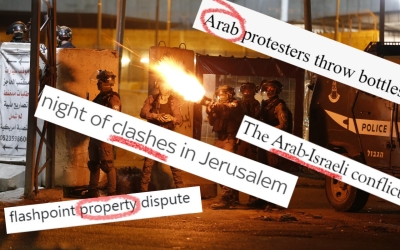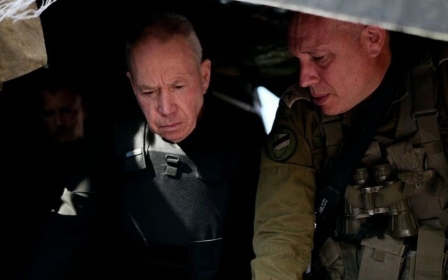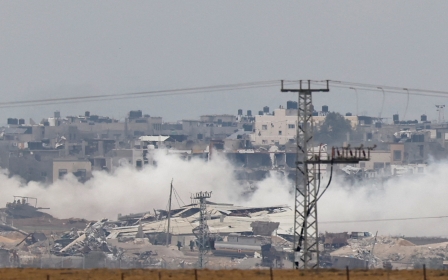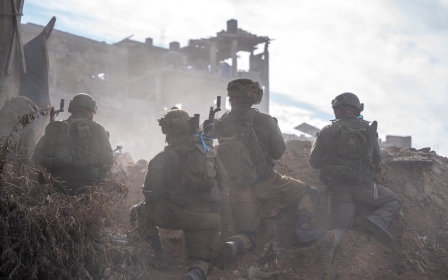War on Gaza: How language used by media outlets downplays Palestinian suffering
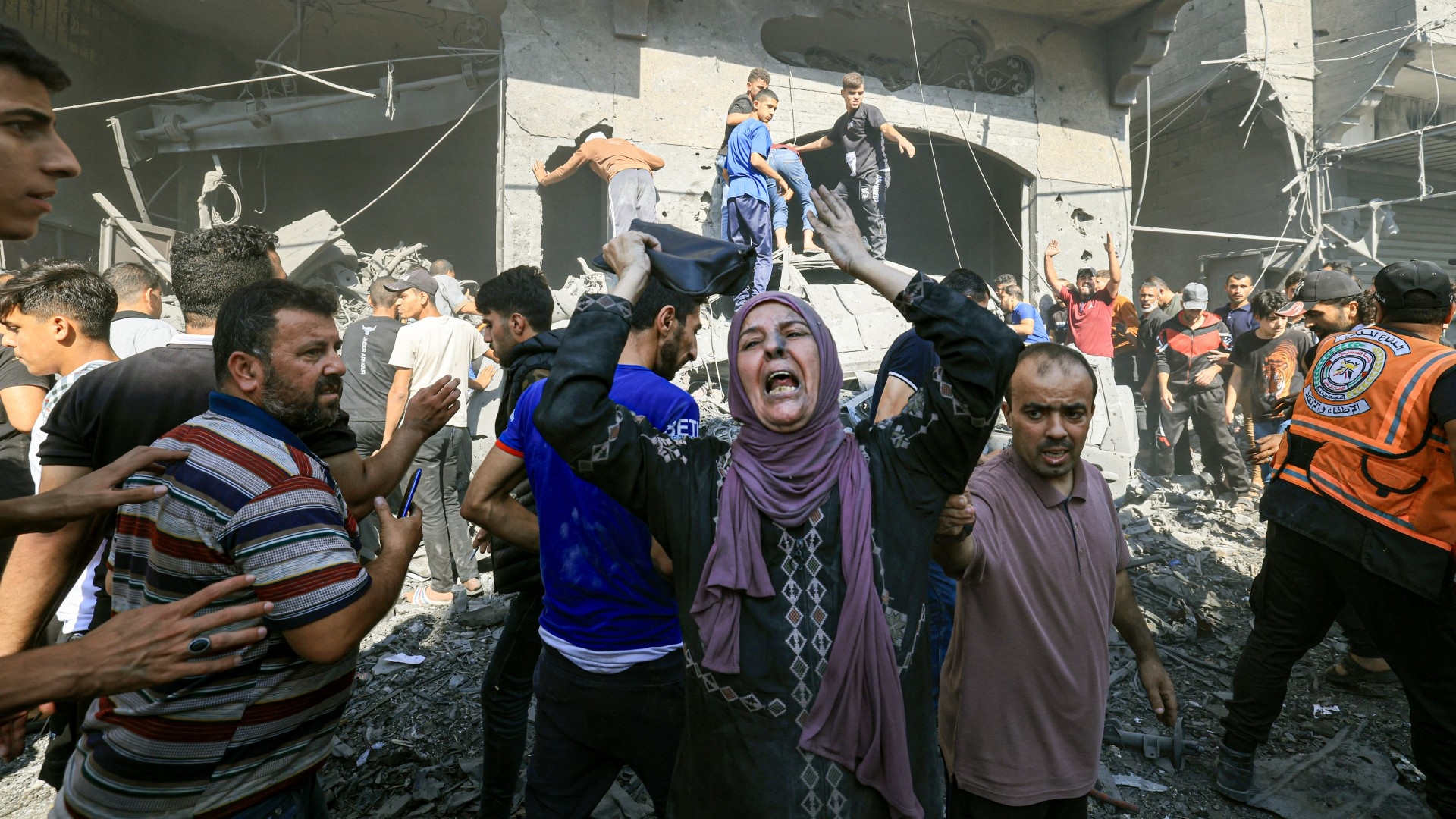
The use of words and the choice of terminology are significant when it comes to the reporting of global events, with words carrying meanings that have the power to move or change opinion, imply or suggest images, and at times downplay the extent of what is happening.
This is particularly true when it comes to relations between Israel and Palestine, with activists and human rights campaigners frequently calling out news organisations for their choice of language and use of passive voice.
Since the outset of the latest hostilities in Gaza on 7 October, there has been a sharp focus on the terminology used by various news outlets, commentators and reporters in their coverage.
Abdulkader Assad, a US-based linguist and journalist, says that when it comes to the current coverage of Israel's assault on Gaza, language can be manipulated to skew meanings and opinions.
"Language is the most powerful tool outside of the battlefield, and the western media knows this and is using it well to the advantage of Israel," he told Middle East Eye.
New MEE newsletter: Jerusalem Dispatch
Sign up to get the latest insights and analysis on Israel-Palestine, alongside Turkey Unpacked and other MEE newsletters
The language expert says that the choice of vocabulary has both psychological and emotional effects on the readers or listeners of the news or other media coverage, which can then influence their opinions.
"The way the western media is "framing" headlines and opening paragraphs of their news coverage of the Israeli occupation's war on Gaza is intentionally meant to sway opinions and help consolidate a perception of Gaza with its entire population as 'militants', and thus the bombardment and killing then becomes justified," he says.
The war on Gaza started after a Hamas-led attack on Israel on 7 October resulted in the deaths of around 1,200 people.
'Language is the most powerful tool outside of the battlefield, and the western media knows this and is using it well to the advantage of Israel'
- Abdulkader Assad, linguist
In response, the Israeli military has killed more than 20,000 Palestinians in attacks since then, most of them children and women. In the process, residential towers, places of worship and schools have been razed by air strikes, while has Israel also cut off all fuel, water, food and electricity supplies for the besieged enclave since 9 October.
According to Assad, when it comes to English linguistics, "framing" refers to the way certain information is presented in order to impact decision making.
One example he gives is a Wall Street Journal (WSJ) article published on 20 December which reads: "Hamas starts planning for end of war with Israel", a headline that has since been edited.
"This headline is powerfully framed by the WSJ to convey a notion of Hamas being the one that started 'war' against Israel," he says.
He also says the headline is an example of "language bigotry".
"This is meant to make readers convinced that Hamas started the war with Israel and is planning to end it," he says.
This, he says, can be problematic because it presents Israel as a passive victim of war and does not convey the disproportionate response that has taken place, which has now been going on for more than two months.
Dehumanising Palestinians
Another issue with mainstream media coverage is the use of the passive voice, linguists say.
Lara Gibson, an Egypt-based writer and linguist, says that this often dehumanises Palestinian victims.
"In western outlets, we have repeatedly seen Palestinians described in the passive voice, dehumanising victims by taking away their autonomy. At the same time, Israel is typically described in the active voice, which infers to western readers that they can get behind the Israeli clause and justify their actions," she told Middle East Eye.
Assad agrees, saying that, as well as dehumanising Palestinian suffering, it can also downplay Israeli crimes.
"The western media uses purposeful 'euphemism', masking the truth of harsh words that express Israeli acts of war crimes," he says.
"When the western media uses the passive voice, it intentionally ignores the 'who' did 'what' to 'whom' principle that is needed for a piece of information to be complete.
"They use the passive voice to evade the truth and somehow make Israeli war crimes look doubtful."
Assad highlights one example from Reuters, saying that it "let Israeli forces off the hook" when reporting on the killing of the news agency's own photojournalist Issam Abdullah, on 13 October.
The Reuters headline read: "Issam Abdallah, a Reuters videographer, was killed while working in southern Lebanon".
"This way, the readers don't know who killed Issam, and of course this serves best for obscuring the fact that Israeli forces killed the journalist. Once the readers see this headline, they would 'store' the fact that a journalist was killed, but without storing in their minds the criminal who did it," Assad says.
Vague language
Some words in particular have emerged during the current coverage, and have largely been seen as problematic for either suggesting equivalence between the Israeli military and Hamas or by using ambiguous language to remove blame.
"Several large publications have deliberately used vague language to describe devastating attacks on Gaza, yet, in contrast, language to describe the attacks on Israel of 7 October was incredibly clear and descriptive - implicitly supporting the Israeli cause," says Gibson.
"Terms like 'war' suggest an equal contest rather than an Israeli-powered genocide," she says.
The Oxford Languages definition of war is "a state of armed conflict between different countries or different groups within a country".
According to an Axios report earlier this year, Israel has an annual military budget exceeding $20bn and access to some of the most advanced US military hardware. Israel also controls the skies and much of the sea around its territory.
'Several large publications have deliberately used vague language to describe devastating attacks on Gaza, yet in contrast language to describe the attacks on Israel of 7 October was incredibly clear and descriptive'
- Lara Gibson, linguist
Israel is claiming to be in Gaza to "eliminate Hamas". However, soldiers have used unguided bombs, drone strikes and bulldozers to target civilians.
Meanwhile, Hamas's armed wing, the Qassam Brigades, relies on guerrilla-style warfare strategies using rockets, snipers and home made explosives.
Using the term "war" therefore implies that both the Qassam Brigades and Israel hold similar power, and that Gaza is a country instead of a besieged enclave, obscuring the nature of the violence taking place, Gibson argues.
"The term 'Hamas militant' has further been weaponised by Israel as they use this word liberally to justify the slaughter of Palestinian civilians," she says.
Some news outlets have also chosen to use the term "Gaza militants", which runs the risk of conflating the population of the besieged enclave with those carrying out the attacks and creates a negative association with civilians there.
Assad believes that this can go as far as being a euphemism.
"This is a word or phrase that softens an uncomfortable topic. It uses figurative language to refer to a situation without having to confront it," he says.
A widely used example of this is to use the word "dying" instead of being "killed", he says, something which appeared in a BBC headline on 19 December.
Inaccurate terminology
Some have also pointed out that inaccurate terms and phrases have also been used during the current coverage.
One such example is referring to the Palestinian Ministry of Health as the "Hamas health ministry" when citing various reports on casualties.
The title is not accurate, as the Hamas movement is not involved in the ministry's documentation and the ministry works closely with other officials who oversee the reports based in the occupied West Bank city of Ramallah, including health minister Dr Mai al-Kaila.
The attribution to Hamas has even caused some people, including US President Joe Biden, to question the validity and reliability of the numbers being released by the ministry.
The Council on American-Islamic Relations called on Biden to apologise for his "shocking and dehumanising comments" after he said he had no confidence in the numbers.
The Ministry of Health has also been proven to be reliable regarding documentation it has released, following doubts over the number of people killed after Israel's bombing of al-Ahli al-Arab hospital, listing the full names and details of those killed.
The information provided in the document gave breakdowns that included identifying information about each person.
The report contained the names of 7,028 people, along with their gender, age and ID number.
Many experts consider figures provided by the Palestinian ministry reliable, given its access, sources and accuracy in past statements.
Omar Shakir, Israel and Palestine director at Human Rights Watch, told the Washington Post the ministry's figures are "generally proven to be reliable".
"In the times in which we have done our own verification of numbers for particular strikes, I'm not aware of any time in which there's been some major discrepancy," he added.
This article is available in French on Middle East Eye French edition.
Middle East Eye delivers independent and unrivalled coverage and analysis of the Middle East, North Africa and beyond. To learn more about republishing this content and the associated fees, please fill out this form. More about MEE can be found here.


